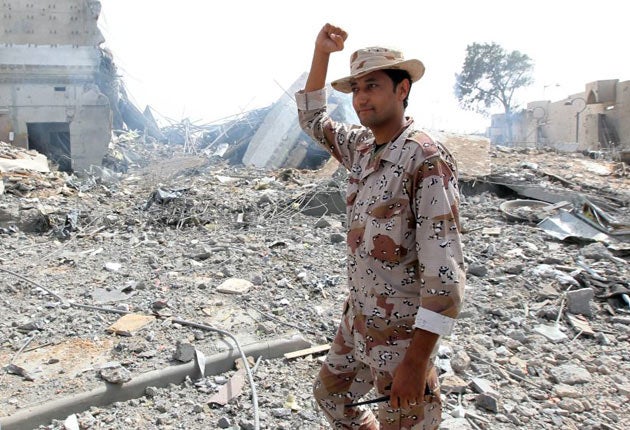Gaddafi regime staked £12bn on secret deal in bid to open peace talks
Memo seen by <i>The Independent</i> reveals Tripoli negotiations

Your support helps us to tell the story
From reproductive rights to climate change to Big Tech, The Independent is on the ground when the story is developing. Whether it's investigating the financials of Elon Musk's pro-Trump PAC or producing our latest documentary, 'The A Word', which shines a light on the American women fighting for reproductive rights, we know how important it is to parse out the facts from the messaging.
At such a critical moment in US history, we need reporters on the ground. Your donation allows us to keep sending journalists to speak to both sides of the story.
The Independent is trusted by Americans across the entire political spectrum. And unlike many other quality news outlets, we choose not to lock Americans out of our reporting and analysis with paywalls. We believe quality journalism should be available to everyone, paid for by those who can afford it.
Your support makes all the difference.The Libyan regime has been negotiating a secret deal with Greece to use $20bn (£12bn) of its funds that are frozen abroad for humanitarian relief to benefit both sides in the civil war. Officials in Tripoli say the move is intended to pave the way for the opening of peace talks.
The Independent has learned that talks were held in Tripoli between a team led by a former diplomat close to the Greek Prime Minister George Papandreou and regime members including the Libyan Prime Minister Al-Baghdadi Al-Mahmoudi. The meetings resulted in a memorandum of understanding that has remained unsigned because, diplomatic sources said, of warnings by the French government to the Greeks that any such agreement would appear to give Muammar Gaddafi legitimacy as Libya's ruler and undermine the policy of the Western coalition to keep him isolated.
Sources within the Libyan regime maintain that an agreement on the use of its assets for aid could lead to a ceasefire agreement and a process under which Colonel Gaddafi would relinquish power while a caretaker administration can be formed that includes members of the Benghazi-based opposition.
Those involved in the negotiations also claim that some officials from the United States were aware of the talks taking place for using unfrozen funds for aid, but have refrained from making public comments due to French sensitivities. Hillary Clinton, the US Secretary of State , said yesterday she was aware of "numerous and continuing" overtures by people close to the Libyan leader to negotiate his departure from power, but did not give further details.
The memorandum, a copy of which has been seen by The Independent, says that Libya and Greece "decided to put in place urgently a humanitarian operation fulfilling the imperative need to serve all the Libya citizens as well as persons of other nationalities living in Libya in urgent need and on an equal footing applying the international humanitarian criteria".
A senior Libyan official, who is currently outside the country, claimed that there was now "personal enmity" – with the French Prime Minister, Nicolas Sarkozy, and the Emir of Qatar, another prominent supporter of the rebels, against Colonel Gaddafi – which was hindering a peace deal and humanitarian efforts.
"We firmly believe that this could start a process of dialogue. This is Libyan money being held by foreign banks. The proposal was that it would have been used to benefit all Libyans on both sides of the terrible division in our country," the official said.
"There is also little doubt in Tripoli that Muammar Gaddafi will have to go. Whether he goes out of the country or somewhere in the desert is something which can be decided later. But making Gaddafi going the pre-condition for talks, which the TNC [Transitional National Council, the opposition administration] and Nato are doing, is simply delaying the talks from taking place.
"The UK has to go along with the French, but we think there are influential people Washington who also want to see the fighting end."
An estimated 10,000 to 15,000 people have been killed on both sides in four months of fighting in Libya, according to a UN panel.
The chief prosecutor for the International Criminal Court has said he is investigating whether Colonel Gaddafi provided Viagra to Libyan soldiers to promote rape. The regime yesterday denied the claims.
A Western diplomatic source also said that French pressure has stymied the projected deal between Athens and the Libyan regime. But he denied suggestions that the French had raised the issue of Greek indebtedness to the European Union as a lever, before adding: "They did not have to, it was pretty implicit in the message."
A bipartisan group in the US Congress has urged Barack Obama to use frozen assets of the Libyan regime to pay for humanitarian supplies. At the same time, Mr Obama is facing increasing criticism from Republicans and Democrats over his backing for the war.
Meanwhile, at a meeting of the "Libyan contact Group" in Abu Dhabi yesterday, the rebels received pledges of $1bn in aid. But the figure fell short of the sum requested by the TNC in Benghazi. The opposition administration said it needs at least $3bn.
Join our commenting forum
Join thought-provoking conversations, follow other Independent readers and see their replies
Comments